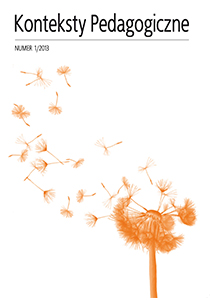Abstract
In the article the author argues that the use and spread of proinclusive activities and solutions in education systems, though much anticipated and so-cially desired, are inflexible and hindered for a number of reasons. These reasons, characterized in the article, include the lack of proper preparation on the part of inclusive education counsellors and teachers as well as issues related to the social status of students. The article points out the need to monitor those groups and successively eliminate the problems with a view to creating an education system whose proinclusive offer would be sufficiently flexible and varied to provide for pupils with special needs.
References
Bartnikowska U., Ćwirynkało K., Rodziny adopcyjne i zastępcze dziecka z niepełnospraw-nością, Kraków 2013.
Chrzanowska I., Poziom osiągnięć szkolnych uczniów ze specjalnymi potrzebami edukacyj-nymi na etapie gimnazjum a forma organizacyjna kształcenia, Łódź 2004.
Chrzanowska I., Zaniedbane obszary edukacji – pomiędzy pedagogiką a pedagogiką spe-cjalną, Kraków 2009.
Dolata R., Szkoła – Segregacje – Nierówności, Warszawa 2008.
Edukacja przedszkolna. Polityka samorządów gminnych w zakresie edukacji przedszkolnej, red. P. Swianiewicz, Warszawa 2012.
Janiszewska-Nieścioruk Z., Aktualne preferencje edukacyjne uczniów o specjalnych potrze-bach i ich konsekwencje, [w:] Szkoła dla osób z niepełnosprawnością. Wzory – codzien-ność – wyzwania, Dyskursy Pedagogiki Specjalnej, t. 10, red. A. Krause, J. Belzyt, S. Sadowskiej, Gdańsk 2012.
Janiszewska-Nieścioruk Z., Problematic availability of educational system for people with disabilities, [w:] Disability – the contextuality of its meaning, red. T. Żółkowska, L. Konopska, Szczecin 2010.
Janiszewska-Nieścioruk Z., Trudności związane z implementacją probolońskich zmian w kształceniu pedagogów i nauczycieli, „Niepełnosprawność i Rehabilitacja” 2013, nr 1.
Koraszewski A., Dzieci mlecze, www.racjonalista.pl/kk.php/s,5622 [dostęp: 20.07.2013].
Kosakowski C., Węzłowe problemy pedagogiki specjalnej, Toruń 2003.
Kwieciński Z., Wykluczenie, Toruń 2002.
Mastalerz-Jakus K., Warunki edukacji przedszkolnej 2012 po pierwszym roku obowiąz-kowej nauki dzieci pięcioletnich, Warszawa 2012, www.rzecznikrodzicow.pl/sites/default/files/raport/_edukacja_przedszkolna_calosc.pdf [dostęp: 20.07.2013].
Murawska B., Segregacje na progu szkoły podstawowej, Warszawa 2004.Szkudlarek T., Edukacja i konstruowanie społecznych nierówności, [w:] Fenomen nierów-ności społecznych, red. J. Klebaniuk, Warszawa 2007.
Szumski G., Integracyjne kształcenie niepełnosprawnych, Warszawa 2006.
Śliwerski B., Oświatowy remanent, czyli o ideologicznym majsterkowaniu polityków oświa-towych w latach 1989-2006, [w:] Wychowanie. Pojęcia–Procesy–Konteksty. Interdyscy-plinarne ujęcie, red. M. Dudzikowa, M. Czerepaniak-Walczak, Gdańsk 2008
.Śliwerski B. (rozmowa), Zmierzamy ku edukacyjnej katastrofie, „Gazeta Prawna” z 13.03.2013, http://wiadomosci.onet.pl/kraj-prof-boguslaw-sliwierski-zmierzamy-ku-edukacyjnej-,1,5485780,wiadomosc.html [dostęp: 20.07.2013].
In accordance with the recommendation of the Ministry of Science and Higher Education, which aims to counteract the practice of “ghostwriting” and “guest authorship,” all authors submitting their text for publication should attach an author’s statement which declares the contribution of each of the authors to the article. The printed and signed statement should be delivered by mail or other means to editor-in-chief Joanna Skibska or sent in the form of a scan to the following e-mail address: redakcja@kontekstypedagogczne.pl. The authors will not receive remuneration for publishing their papers. The editors reserve the right to make minor editorial changes to the articles which will not affect the substance of the article. We encourage all authors to prepare their articles in accordance with the guidelines for manuscript preparation. Download pdf file.
Authors transfer all copyrights and grant the journal the right of first publication with the work simultaneously licensed under a Creative Commons Attribution License that allows others to share the work with acknowledgement of the work's authorship and initial publication in this journal. All authors agree to the publishing of their email addresses, affiliations and short bio statements with their articles during the submission process.

